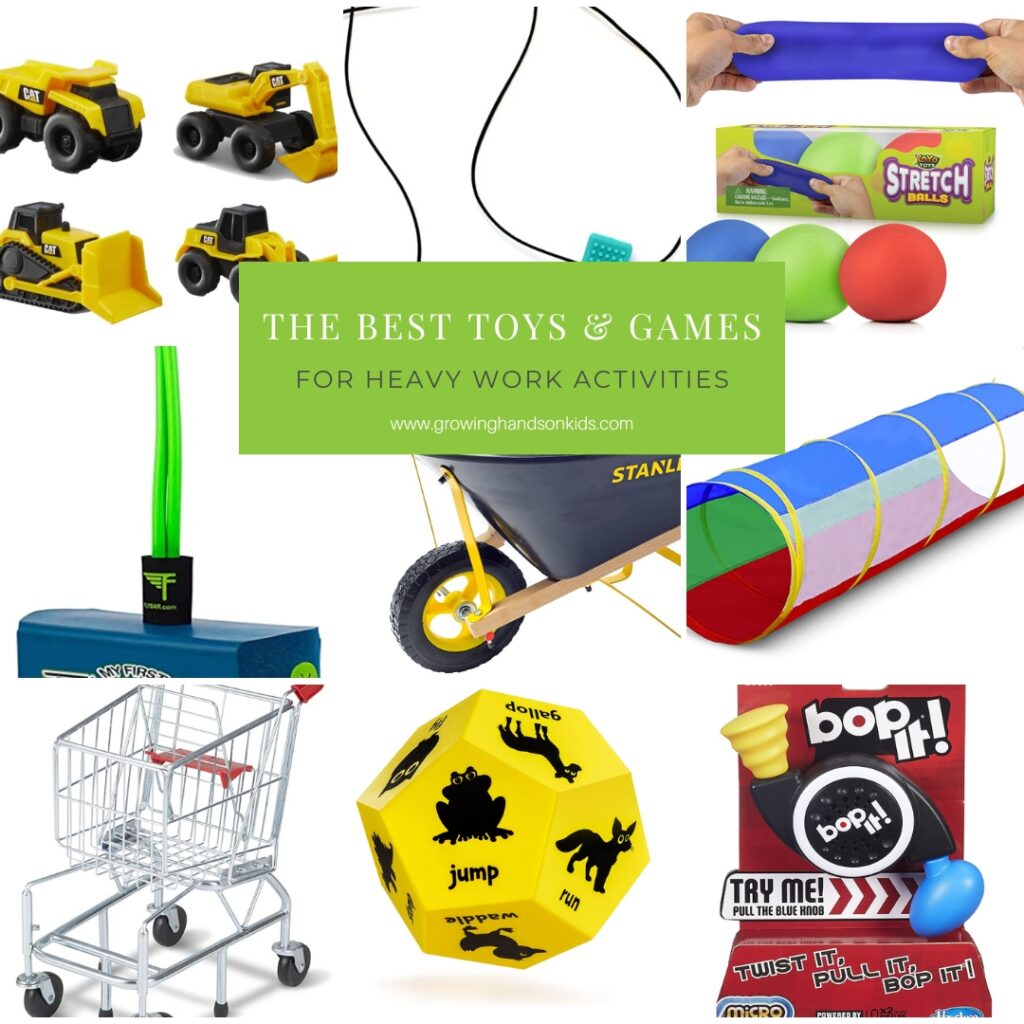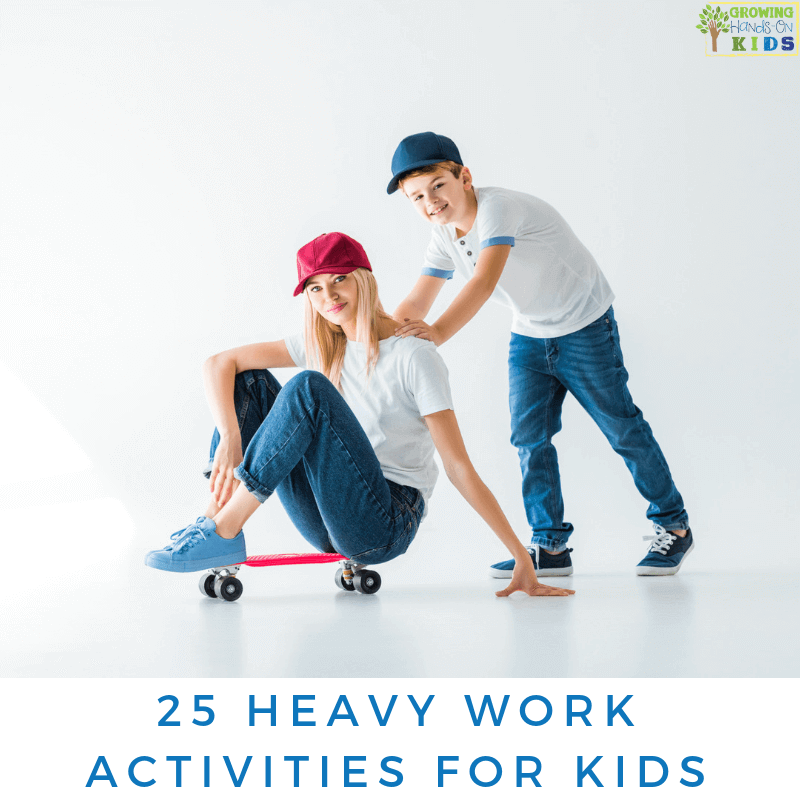The Best Toys & Games for Heavy Work
Affiliate and Referral links are used below to promote products I love and recommend. I receive a commission on any purchases made through these links. Please see my disclosure policy for more details. As an Amazon Associate, I earn from qualifying purchases.
The holidays are coming up and this is the perfect time to add some toys and games for heavy work to your child's gift list. Today I'm going to share some of the best toys and games for heavy work that you can use as a gift guide for holidays, birthdays, and more.
What are heavy work activities?
Heavy work is a term coined to describe proprioceptive input or proprioception. You can think of proprioceptive input as any type of movement that activates the sensory receptors in your muscles and joints. Proprioception is responsible for body awareness or knowing where your body is in space.
This input can be activated by all kinds of movement such as jumping, climbing, pushing, pulling, running, etc. Any type of movement that gets the big muscle groups of the arms and legs, along with the mouth, can activate proprioception receptors.
Proprioceptive input is often very calming and regulating for many children.
You may also see heavy work referred to often when sensory diets are mentioned with Occupational Therapy. Many children who are diagnosed with sensory processing difficulties (Sensory Processing Disorder, SPD), Autism, Anxiety, or just have sensory processing challenges can benefit from proprioceptive input throughout their day to help them self-regulate emotions, energy levels, concentration, and focus.
You can read more on sensory diets here.
The Best Toys & Games for Heavy Work
Under each toy, I will list which sensory systems this toy can target along with some actionable tips. Also, if there are any age recommendations I will add that as well.
You can find an overview of all 8 sensory systems here if you need a refresher.
Most of these items can be found on Amazon. A few of the items can also be found on other therapy-related sites, so I have linked those when appropriate.
Please make sure you read all safety and age recommendations on each product before you purchase.
Sensory input: Proprioception, Vestibular
This specific pogo jumper is designed for ages 3+. It is also made of foam and has a wider base of support instead of your typical pogo stick, which is great for younger children.
For older children, you could definitely get them a regular pogo stick to get the same jumping benefits that activate the proprioception system. And don't forget safety equipment like a helmet.
Sensory input: Proprioception, Vestibular
Mini trampolines are a favorite of mine. We've had one since 2014 when my daughter was 2 years old. Both of my children are 10 and 7 and we still use it, though I could probably update to a newer, larger one.
We have ours in the movement area of our basement. You could put yours in a sensory space or playroom area of your house.
Sensory input: Proprioception, Vestibular
If you are short on space for a mini trampoline, moon shoes are a great alternative for preschool and up.
These specific moon shoes are rated for up to 130 lbs and size 9 shoes, one size fits all. I'm going to be getting my daughter a pair of these for Christmas. They were also a very popular tool I used when working in the school system.
Sensory input: Proprioception, Tactile, Visual
This toss-and-catch ball game is also a favorite at our house. Not only is it great for proprioceptive feedback through the arms and hand, but it is also great for eye-hand coordination.
Sensory input: Proprioception, Vestibular
Wheelbarrows are a great way for kids to push heavier objects around the yard, either with play or helping with yard work. For younger children, you can also get this really cute gardening set that comes with a smaller wheelbarrow (recommended for ages 3 and up).
Sensory input: Proprioception
Does your grocery store have those mini grocery carts for kids? Ours are always hit-and-miss, but my kids LOVED using them. And if I was feeling extra brave we would get one during our shopping trip. 😉 Thanks for online grocery shopping, we don't do it as much anymore.
This child-sized grocery cart is a great way to get extra proprioceptive input by loading it up with toys or play groceries and pushing it around.
Sensory input: Proprioception, Vestibular
My kids were obsessed with American Ninja Warrior on TV a couple of years ago. This outdoor ninja obstacle course would be an amazing addition to any play area, especially for those who have outgrown their swing or playsets.
Sensory input: Proprioception, Vestibular
Our peanut ball from Fun and Function has been a hit for many years in our home. My kids like to get it out and roll down our small hill in the backyard with it.
I've also got a blog post with some play ideas for a peanut ball here.
Peanut Ball from Fun and Function
Stress Relief Balls
Sensory system: Tactile, Proprioception
These stress relief balls stretch and are fun to squeeze and pull. This is great tactile and proprioceptive input through the fingers and wrist.
Sensory input: Proprioception, Tactile
This construction truck set is the perfect addition to any sand pit or dirt pile that your kids like to play in. Pushing, pulling, and digging in the sand or dirt is a great heavy work activity.
Sensory input: Proprioception, Tactile
Sand is a great heavy work tool because it gives children something “heavy” to push, lift, and dig in. It is also an excellent tactile experience.
If you don't live near a beach, you can create a sand sensory bin or use a sandbox to get the same experience on a smaller scale.
These sand toys include shovels, rakes, buckets, and more to help encourage lots of heavy work play.
Gardening Tools
Sensory input: Proprioception
I love getting child-sized tools for everyday items.
Garden tools such as shovels and rakes give great proprioceptive feedback and can be used in many ways. Digging in the dirt, shoveling snow or sand, raking leaves in the fall, or gardening in the summer months.
Tunnels
Sensory input: Tactile, Proprioception, Vestibular
Tunnels are great to get kids crawling on all fours. Crawling provides excellent proprioceptive and vestibular feedback through the arms and legs. Plus they are super fun to include in obstacle courses or in your play area.
Sensory input: Proprioception, tactile, gustatory (taste)
Fidget chews or sensory chews are a great way to get proprioceptive input through the mouth. Children who like to chew and explore through their mouths often need extra proprioceptive input through their mouth.
There are loads of different types of sensory chews out there. Here are a few places that I have used below:
- Amazon
- Fun and Function
- Ark Therapeutic – Made in the USA
- Therapy Shoppe
- Chewigem
Animal Action Cards or Dice for Animal Walks
Sensory input: Tactile, Vestibular, Proprioception, Auditory
These animal action cards or animal action dice make the perfect heavy work gift for younger children ages 2 and up. You can also add having the child make the sound that goes along with that animal for added auditory input.
Twister
Sensory input: Vestibular, Proprioception
This classic game is ideal for ages 6 and older. It is great to get kids moving and putting their bodies in different positions. Plus having to hold their bodies in different positions is a great way to build endurance and activate the proprioception system.
Sensory input: Proprioception, Auditory, Visual
This Bop It game would be great for older children to get proprioceptive input through the hands and arms. This classic game has children push, pull, and bop the game piece following the prompts from the game.
It is a fast-paced game and appropriate for ages 8 and older.
Best Toys & Games for Heavy Work Amazon Storefront
I created the best toys and games for heavy work list on my Amazon storefront. You can click here and head over to my Amazon storefront, follow me, and scroll down to see all the lists I have created.
Other websites to check out for heavy work toys and games include the following:
You May Also Like:

Heather Greutman, COTA
Heather Greutman is a Certified Occupational Therapy Assistant with experience in school-based OT services for preschool through high school. She uses her background to share child development tips, tools, and strategies for parents, educators, and therapists. She is the author of many ebooks including The Basics of Fine Motor Skills, and Basics of Pre-Writing Skills, and co-author of Sensory Processing Explained: A Handbook for Parents and Educators.




















